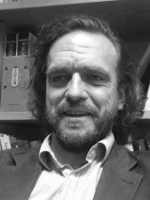Michael Stanley-Baker, PhD

Areas of interest
- Medicine and Religion in China
- History of Chinese Medicine
- Early Medieval China
- Science and Technology Studies
- History of Knowledge
Research project: Medicine and Religion in Early Imperial China
The classical medical tradition which emerged during the early unification of China in the Han Dynasty (206 BCE – 220 CE) has never been distantly separate from a large, complex field of competition, including many religious actors, such as Buddhists, Daoists, transcendents and trance-mediums, diviners and diverse other experts of various health technologies. Nevertheless, the history of Chinese medicine has been largely written within a disciplinary focus that has separated out the classical tradition from these wider actors – who were more populous, and left more records from early imperial China than did the progenitors of what is now the medical tradition.
It has been imagined that break of the classical tradition from earlier religious traditions was characterised a focus on rational-empirical understandings of the world and how it operated. However, this picture of epistemological incommensurability is not consistent with later (200-589) texts, which admit a complex admixture of approaches that include classical practices such as drugs, acupuncture and moxibustion alongside ritual interventions, self-cultivation, meditation, geomancy and divinatory practice, to name a few. The imperial bibliography of the Han court places transcendence in the same category of knowledge as medicine and drug recipes: they were classed under the same section of “technical methods.” By the seventh century however, similar state catalogues placed medicine in a quite different section from Daoist and Buddhist literature. This implies over the intervening period there was a long-term, distancing of medicine from religion, which emerged gradually over time. My book seeks to tease out some of the major features of this transition.
While at the KFG I will be working on a book which describes the contours of that early medical pluralism and some of the ways in which different actors structured, differentiated and equated various therapeutic styles.
Embedded into my inquiry is the question of how religion and medicine were figured in early imperial China. The goal is to avoid a foundationalist approach which prefigures those two things in modern terms. Rather, I am interested in writing in a way that is open-ended, allowing that multiple actors approach in different and sometimes quite contrary ways the questions of where religion ends and medicine begins, and how to compare different knowing or practice styles. This question thus involves a turn away from the history of ideas, and a turn towards the history of practice, and calls for new methodological approaches to the study of medicine in China.
I have found it very useful to think in terms of Situating Knowledge, knowledge as practice, and in terms of ontologies and process, and these guide my writing on this subject.
Biography
Assistant Professor, Nanyang Technological University, Singapore
Post-Doctoral Researcher, Max Planck Institute for the History of Science, Berlin
Junior Visiting Scholar, Academia Sinica, Taipei
Visiting Fellow, Needham Research Institute, Cambridge
Doctoral Student, University College London
Relevant Publications
- Stanley-Baker, Michael, and Dolly Yang (2017). “Dung, Hair and Mungbeans: Household remedies in the Longmen Recipies.” In Buddhism & Healing in East Asia. Edited by Pierce Salguero, 454-77. New York: Columbia University Press.
- Stanley-Baker, Michael (2017). “Brahmanic Massage Techniques: From Sun Simiao’s Essential Recipes worth a Thousand Gold.” In Buddhism & Healing in East Asia. Edited by Pierce Salguero, 533-37. New York: Columbia University Press.
- Stanley-Baker, Michael, Zhang Ruixian 張瑞賢, and Wang Jiacai 王家蔡 (2017). “The Earliest Stone Medical Inscription.” In Imaging Chinese Medicine. Edited by Vivienne Lo. Leiden: Brill (forthcoming).
- Stanley-Baker, Michael, and Brent Ho Leung Ho (2015). “Mapping Drugs across Epistemic and Geographic Domains: A case study for Early Medieval China.” In Conference Proceedings of the 6th International Conference of Digital Archives and Digital Humanities, Taipei, Taiwan, 117-27.
- Stanley-Baker, Michael (2014). “Sensory Spectra of Inner Bodily Awareness: A selection of pre- and early Imperial textual passages on meditation and healing.” In Meditation and Healing in Asian Traditions, International Conference Proceedings, Institute of Mind Humanities, Wonkwang University, Iksan, Korea, 81-108.
- Stanley-Baker, Michael (2014). “Drugs, Destiny and Disease in Medieval China: Situating Knowledge in Context.” Daoism: Religion, History, and Society 6: 113–156.
- Stanley-Baker, Michael (2012). “Palpable Access to the Divine: Therapeutic Massage, Visualisation and Internal Sensation.” Asian Medicine: Tradition and Modernity 7/1: 101-27. Winner of Zhu Kezhen award.


